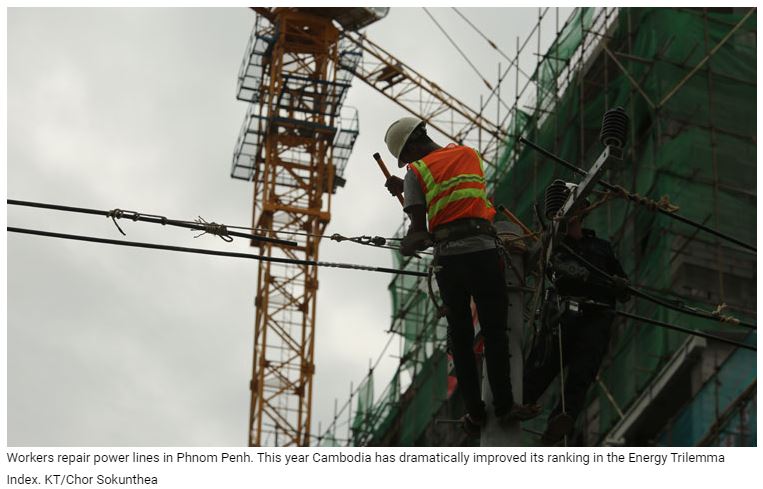Cambodia jumps 12 spots in global energy sustainability survey
Cambodia’s ranking in the latest global energy sustainability survey has improved dramatically, indicating that the Kingdom’s efforts to solve its energy woes and providing an adequate power supply are making headway.
This also means that Cambodia, which suffered a crippling power problem a few months ago, has recovered well from that crisis. After many of its hydropower dams dried up because of a lingering drought, Cambodia was forced to ration power in many parts of the country early this year.
The newly-released 2019 Energy Trilemma Index (ETI) ranked Cambodia 105 out of 128 countries, representing a 12-spot jump from last year. The 2018 ETI placed Cambodia in the 117 spot out of 125 countries included in the survey.
Cambodia is among several countries in Asia and Africa whose rankings have improved remarkably.
“The fastest improvers include Cambodia, Nepal, Bangladesh, Myanmar, Ethiopia, and Kenya, where policies and investments have prioritised accessed to grid and off-grid electricity and households have become progressively wealthier,” the World Energy Council (WEC) said.
The ETI, which is commissioned by the WEC and global management consulting firm Oliver Wyman, ranks countries on their ability to provide sustainable energy. Each country’s energy systems are ranked based on three dimensions: Energy security, energy equity, and environmental sustainability.
Energy security refers to the adequacy of energy supply and a country’s ability to recover from system shocks. Energy equity, meanwhile, measures energy access and affordability from the perspective of consumers, while environmental sustainability ranks a country’s efforts to avoid or mitigate environmental damage.
This year, the Kingdom was ranked 77 in energy security, 110 in energy equity, and 92 in environmental sustainability.
Globally, the ranking was dominated by Europe, with nine of the top ten countries being from that continent. Switzerland was ranked number one, followed by Sweden, Denmark, the United Kingdom, Finland, France, Austria, Luxembourg, and Germany. New Zealand, the only non-European country in the top ten, was ranked ten.
Singapore, which ranked 43 globally, was the highest-ranking country from Southeast Asia, followed by Malaysia (51), Brunei (56), Indonesia (69), Vietnam (91), Philippines (94), and Myanmar (104). Laos was not included in the survey.
Cambodia appears to have partially solved its chronic power shortage by buying additional power from neighbouring Laos, Vietnam, and Thailand.
Last month, Cambodia signed an agreement to purchase 2,400 megawatts from Laos.
From relying mostly on hydropower dams and coal-fired power plants, Cambodia has now started to diversify its energy sources.
By 2020, the government is aiming for solar power to make up 15 percent of the Kingdom’s total energy production. Since the power crisis, Cambodia has approved a host of solar energy projects in Kampong Speu, Kampong Chhnang, and other provinces, with more under consideration.
“This figure of 15 percent includes solar projects in Bavet, Kampong Speu, Kampong Chhnang, Battambang and Siem Reap provinces,” Keo Rattanak, director-general of the state-owned utility company Electricite du Cambodge, told the local media earlier.
The Kingdom is also looking at harnessing its wind power potential. In May this year, the French company Blue Circle completed a feasibility study for a project to build wind turbines in the Kingdom.
Source: https://www.khmertimeskh.com/50649231/cambodia-jumps-12-spots-in-global-energy-sustainability-survey/


 English
English




